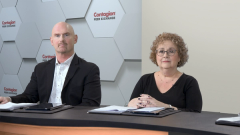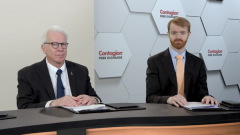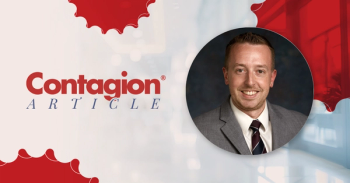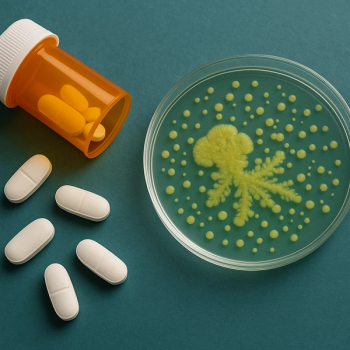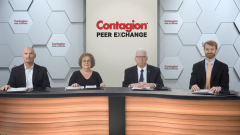
Role of Live-JSLM in Treating Recurrent CDI
Joseph Reilly, BS, PharmD, BCGP, and Andrew Skinner, MD, discuss the potential benefits of using live-jslm early on to treat CDI, as well as the implications of this new treatment.
Episodes in this series

Stuart Johnson, MD: This brings up a point, and we talked about this a bit, but one-third of the PUNCH CD3 participants were enrolled after only 1 CDI recurrence. Are there benefits to starting FMT [fecal microbiota transplant] early on? This is a loaded question, certainly for people that write the guidelines, I suppose.
Joseph Reilly, PharmD, BS, BCGP: We can all answer our opinion on that. My feeling is, you had mentioned before about longer-term antibiotics according to the guidelines, longer-term antibiotics to treat C. diff in these tapered and pulse regimens. And what happens when they finish their antibiotics? Now, it's just like they have dysbiosis at this point anyway. My feeling is the nature of the disease with recurrences that get higher and higher and higher, now that we have an FDA-approved product that's on the market that's been tested and proven to be safe and effective, I would certainly consider fecal transplant earlier on in therapy. And I would say on a case-by-case basis. You can look at these patients and imagine maybe on their first episode, and there's good data supporting FMT after the first episode, but maybe you think that this patient wouldn't respond well or wouldn't do well if they got CDI again and you might opt to treat this patient earlier on.
Stuart Johnson, MD: To that point, there was a report recently from the Lancet Gastro[enterology] & Hepatology journal last year by Simon Mark Dahl Baunwell, MD, et al, that did conduct a randomized, double-blind, placebo-controlled trial of patients with a first episode and first recurrence. And interestingly, it was stopped at the interim analysis after only 42 patients had been randomized and it was stopped because of efficacy. And so, it’s 1 study, randomized controlled trial, that looked like it was fairly well conducted, that did show that it was beneficial to patients with early C difficile infection. One of the caveats looking at this paper was that only 35% of first-episode patients in the placebo group had a resolution by 8 weeks. That means a 60% recurrence rate for people in the placebo group after the first episode, which is really high, and that's a bit unexplained. I'm not sure how that is explained by the study, but it’s evidence that, again, this may be effective in first and second episodes.
Joseph Reilly, PharmD, BS, BCGP: If you look at that study you mentioned, what's interesting, they stopped that study early, but if you look at the inclusion criteria in the PUNCH CD3 trial, just like a lot of FMT trials, they exclude patients who have severe disease or patients with inflammatory bowel disease [IBD] that's active or in remission or celiac disease. But in this study you're referring to, even though there was only 21 patients in each arm, most of these patients, the majority of them, had severe C diff. And many of the patients had—well, I say many, it was only 21 patients per arm—but there was a significant number of patients in the study that had inflammatory bowel disease, that were immunocompromised, even active IBD. It was a bit different. These patients were, seemed to be a lot sicker, if you will, and the outcomes were impressive.
Stuart Johnson, MD: That might explain the increased recurrence rate. Frankly, I'd never heard of a 60% recurrence rate for first episode.
Joseph Reilly, PharmD, BS, BCGP: Like I said, a lot of these patients, it was over 70%, had severe CDI.
Stuart Johnson, MD: Andrew, what are some of the implications of this new treatment for patients suffering from recurrent CDI? And where do you think it fits in the treatment paradigm?
Andrew Skinner, MD: The implications of this are quite broad at this point right now. As we've discussed earlier, the impact that recurrent episodes of C diff have on patients is profound. People are always worried about, ‘Where is the next bathroom?’ They're worried, can they go out and enjoy their life at this point, as well. I think that adding in another adjunctive therapy at this point right now to help reduce the rates of C difficile recurrence is going to have major implications for our patients. Where this fits into the treatment paradigm is a trickier answer at this point right now. And one of the issues that we ran into with bezlotoxumab was that it was the logistical issues when it came to where do we place this. Because it's seemingly a difficult thing to get set up for the patients to come in and get an infusion, cost can become an issue, etc. And we may end up running into something fairly similar when it comes to Rebyota at this point as well, in that maybe not, while we had discussed earlier, is that it may have some roles from a case-by-case for the first episode or second episode, I likely see it fitting somewhere in between the second and third episode, similar to where bezlotoxumab is at this point right now.
Stuart Johnson, MD: Primarily from logistic issues, insurance payments.
Andrew Skinner, MD: Yes, that's going to be the biggest holdup at this point right now, is trying to figure out how people are going to be able to set up coming in to get an enema done. Do you have the correct space to provide the enema, and then, where insurers are going to fall on this as well and are people going to be paying out of pocket, and so forth.
Transcript edited for clarity
Newsletter
Stay ahead of emerging infectious disease threats with expert insights and breaking research. Subscribe now to get updates delivered straight to your inbox.

